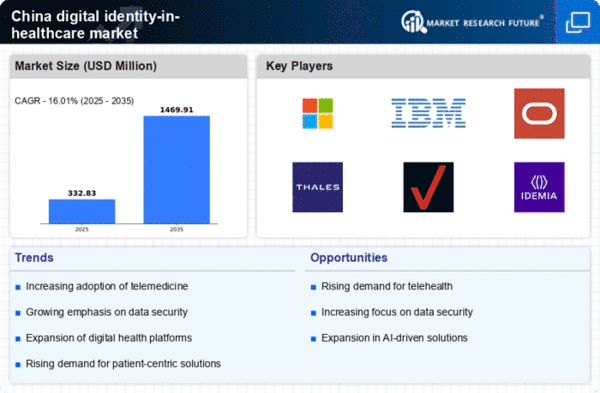Rising Cybersecurity Concerns
As the digital identity-in-healthcare market expands, so do concerns regarding cybersecurity. With increasing incidents of data breaches and cyberattacks, healthcare organizations in China are prioritizing the implementation of robust digital identity solutions to protect sensitive patient information. Reports indicate that nearly 40% of healthcare organizations have experienced a data breach in the past year. This alarming trend underscores the necessity for secure identity management systems that can safeguard patient data. Consequently, investments in cybersecurity measures are expected to rise, further driving the growth of the digital identity market as organizations seek to mitigate risks.
Advancements in Biometric Technologies
The digital identity-in-healthcare market is witnessing significant advancements in biometric technologies, which are becoming increasingly integral to patient identification processes. Innovations such as fingerprint scanning, facial recognition, and iris scanning are being adopted to enhance security and streamline patient interactions. In China, the biometric market is projected to grow at a CAGR of 20% over the next five years. These technologies not only improve the accuracy of patient identification but also reduce the potential for fraud and identity theft. As healthcare providers recognize the benefits of biometrics, the demand for these solutions is likely to escalate, driving market growth.
Growing Demand for Telehealth Services
The digital identity-in-healthcare market in China is experiencing a surge in demand for telehealth services. This trend is driven by the increasing need for remote consultations and healthcare access, particularly in rural areas. As of 2025, it is estimated that telehealth services could account for approximately 30% of all healthcare interactions in the country. The integration of digital identity solutions facilitates secure patient identification and authentication, ensuring that telehealth services are both efficient and safe. This growing demand is likely to propel investments in digital identity technologies, as healthcare providers seek to enhance patient experience and streamline service delivery.
Government Initiatives for Digital Health
The Chinese government is actively promoting digital health initiatives, which significantly impacts the digital identity-in-healthcare market. Policies aimed at enhancing healthcare accessibility and efficiency are being implemented, with a focus on digital identity solutions. For instance, the government has allocated over $1 billion to support the development of digital health infrastructure. This funding is expected to bolster the adoption of digital identity technologies, enabling secure patient data management and improving overall healthcare delivery. As these initiatives progress, the market is likely to witness accelerated growth, driven by both public and private sector collaboration.
Increased Patient Awareness and Engagement
There is a notable increase in patient awareness regarding digital health solutions, which is positively influencing the digital identity-in-healthcare market. Patients are becoming more engaged in their healthcare journeys, seeking secure and efficient ways to manage their health information. Surveys indicate that over 60% of patients in China prefer digital identity solutions that allow them to control access to their health data. This shift in patient behavior is prompting healthcare providers to invest in user-friendly digital identity systems that enhance patient engagement and trust. As patients demand more control over their health information, the market is likely to expand to meet these expectations.
















